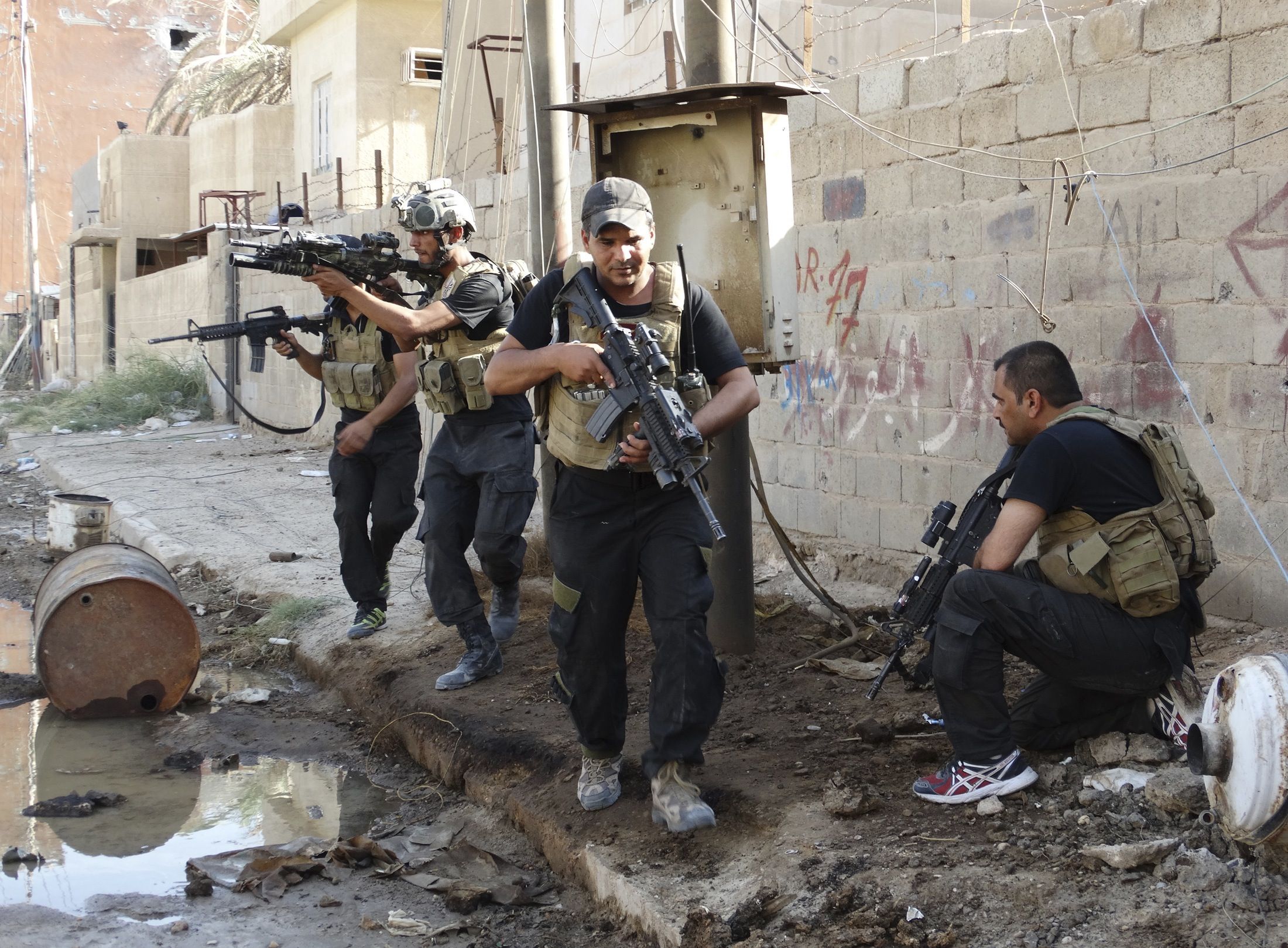
The "surprising" collapse of the Iraqi army and the defection of key Sunni tribal leaders to al-Qaeda-inspired insurgents has largely stripped the CIA of spies in the embattled country, according to knowledgeable intelligence sources. As a result, according to a U.S. intelligence official, the CIA is mostly relying on "technical means"—electronic intercepts of all kinds—and the support of friendly regional secret services, like Jordan's, to monitor the rapidly deteriorating situation.
President Obama's announced dispatch of 300 Special Forces advisors to Iraq will have little effect on the advance of the rebels, known as the Islamic State of Iraq and the Levant—and may even worsen the situation, say former and present CIA officers. "The train has left the station," a former top CIA operations official told Newsweek on condition of anonymity because he is not authorized to discuss the situation. "We can monitor where else they are spreading and who their new playmates are, but that is about it. The days of eight guys, bags of money and riding horses [into battle, as in the early days of the Afghan war] are gone."
A former Special Forces operative who did three tours in Iraq before signing up with the CIA said that U.S. intelligence operatives are for the most part "holed up" in the American embassy in Baghdad, unable to meet with sources in Sunni tribes who previously battled al-Qaeda-backed forces, either because their contacts have defected to the insurgents or because travelling to the battle zones is too dangerous.
"Although they've got a lot of people over there, they're not being tasked to do a lot of stuff," said the former operative, who has stayed in touch with former comrades in the embassy. They're continuing to try to stay abreast of developments in their assigned areas, he said, "but from a direct action [counterterrorism missions] standpoint, they're not doing much."
The CIA has also been struggling to find out what's going on inside the U.S.-backed Baghdad regime, the former agency operations official said, since Prime Minister Nouri al-Maliki, a shiite, "purged those who worked with the U.S."
"On the other hand," he added, Maliki "now has Iranian advisors at almost all levels of government and has moved ministries of defense and interior under his direct control."
A U.S. intelligence official insisted that Washington had a clear picture of the rebel force's key personalities and movements, but granted that the mass desertions of Iraqi troops in the northern part of the country "certainly came as a surprise.
"Since the withdrawal of US forces in 2011, intelligence collection in Iraq hasn't been a picnic," the official said in a statement, on condition of anonymity, "and today's situation makes it even more challenging. That said, efforts to collect credible intelligence continue through a variety of means. Our capabilities are intact."
But several former intelligence operatives questioned whether the CIA was capable of staying on top of events in Iraq, give the security breakdown. "It's falling apart," said the former special operations operative. Defense Department and CIA "contractors have been operating the last couple of years in the [outlying] areas at the request of the embassy …" but now, "they say that 70 miles outside of Baghdad, it's just lawless."
The former CIA operations official, who retired after several tours as a station chief in hostile capitals, questioned whether the spy agency had a good grip on the rebel forces, who gathered strength fighting the Assad regime in Syria and then swept south with alarming speed early this month. "These guys have not been well [reported on] in Syria, and it is late to start over," he said. "Also, they will be a very tough target. I imagine we will be working friendly and not-so-friendly [spy] services" from Israel, Jordan, Saudi Arabia and even Iran, "who were quick to offer help after 9/11."
Bombing the rebel forces, he and others said, is impractical. B-52 bombers would cause countless civil casualties. Drone strikes and cruise missiles require accurate intelligence that can be gathered and acted upon quickly. In any event, one former agency official said, they're too small to vaporize mass concentrations of troops. "As much as B-52 strikes would feel good and decimate the ranks of the [rebels], it will not do much more than slow them down or force to stop and consolidate the north," said the former operations official, who said he had consulted with agency colleagues before responding to Newsweek's questions. "It will not take back any towns--as much as the Air Force would argue otherwise. Also, it is not in the interest of the Iranians to take back the north [from the rebels]. A weak south, with its oil, would be easy to maintain as a protectorate."
But Glenn Carle, a former CIA deputy national intelligence officer for transnational threats, argued that it's not too late to carry the battle to the insurgents. "If the ISIL is as conventionally-functioning a force as described, they should be vulnerable to air strikes and military actions," he told Newsweek. "Not that we do the ground stuff, but that we enable others to. Agency people should be involved covertly, targeting, etc., as we did in Afghanistan." The Obama administration "should be talking to Iran" about concerted action, too, Carle said.
But inserting U.S. Special Forces into the fray now could exacerbate the sectarian tensions and political rivalries that are driving the conflict, said Frank Snepp, a former CIA officer who chronicled the chaotic end of the Vietnam War in a controversial 1977 book, Decent Interval. "The President's decision to send 300 Special Forces advisers to help rally embattled Iraqi forces should reassure only those too young to remember the dispatch of the initial sixteen SF operators to Vietnam in 1957," Snepp told Newsweek by email Thursday. "Their numbers expanded quickly, but their 'advisory' and intelligence-gathering efforts merely reinforced deep divisions within the South Vietnamese body politic.
"Die-hard political and religious rivals, who ought to have united to fight the Viet Cong, quickly co-opted the military and police elements the Americans had trained and equipped, and used them to push their own agendas," added Snepp, who published his sensational memoir without clearance from the CIA, which took him to court. "Our well-meaning SF and CIA operators worsened this factionalism by funding certain favored local power brokers, thus making them independent—and defiant—of the central Saigon government, and rendering President [Ngo Dinh] Diem fanatically, and rightfully, suspicious of them."
The situation in Iraq, with Islamic forces closing in an army units deserting en masse, has evoked many comparisons with South Vietnam's collapse in 1975. But for Snepp and others, it looks more like 1963. According to news accounts, U.S. officials have been plotting with Iraqi politicians to get rid of Maliki. In Saigon a half century ago, the CIA backed a military coup to overthrow Diem, following which the U.S. began sending hundreds of thousands of troops to Vietnam.
But the current situation in Baghdad looks more like an end than a beginning, despite the dispatch of the 300 Special Forces troops, most of whom will be helping protect the American embassy. There's no real appetite in Washington for re-introducing American ground units to Iraq.
James McIntosh, a former Vietnam operations chief for the CIA, said the agency is probably preparing for the worst in Baghdad, by gathering up files and working on creating networks of so-called "stay-behind" Iraqi spies. "The destruction of records and sensitive materials is a vast problem," McIntosh said in an email from New Zealand, where he settled after retiring. "There is also likely a lot of sensitive equipment that needs to be either destroyed or shipped out. What about the cash on hand? It's very likely too much to carry. Who's going to give authorization to burn that?
"The idea of preparing stay-behinds, by hiding gold, arms and communications gear" in Iraq should also be at the top of the CIA's agenda, he said.
But the former top CIA operations official, now in his 70s, said he wouldn't put much stock in future spy nets reporting valuable information from Iraq. "Iraqis have learned the lessons the Vietnamese learned about the U.S. We have no patience and will eventually declare victory and leave," he said. "Those who support us will be left to pay the piper. It makes it tough to recruit new sources."
Jeff Stein writes SpyTalk from Washington, D.C. He can be reached confidentially via spytalk@hushmail.com.
Uncommon Knowledge
Newsweek is committed to challenging conventional wisdom and finding connections in the search for common ground.
Newsweek is committed to challenging conventional wisdom and finding connections in the search for common ground.
About the writer
To read how Newsweek uses AI as a newsroom tool, Click here.








